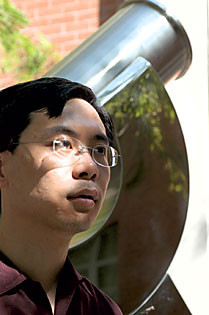 |
|
DAVID HARDEN/Arizona Daily Wildcat
|
University of Arizona Professor of Astronomy Xiaohui Fan is one of Popular Science's "Brilliant 10" for finding over 27 quasars.
|
|
|
By Debra Hollander
Arizona Daily Wildcat
Thursday August 28, 2003
Exhibit highlights the woman behind the man behind the lens
Xiaohui Fan, an assistant professor of astronomy, spends a lot of time standing around in the dark staring up at the sky, but he's not wishing on falling stars, he's looking for quasars.
"I was always interested in how far you can see," said Fan of his research on quasars, extremely distant, old and
enormously bright objects at the edge of the universe whose power output is several thousand times that of the entire galaxy.
Fan, 31, was recently named one of the "Brilliant 10" in Popular Science magazine for research he is doing for the Sloan Digital Sky Survey in which he and other scientists have found more than 30,000 quasars. Fan is leading the effort of discovering the farthest quasars; 11 have been found thus far.
Emily Laber-Warner, the features editor at Popular Science, said there were more than 30 final candidates for the "Brilliant 10."
However, she said Fan stood out with his motivation to succeed.
"One of the things that made him really stand out was the fact that as a student in China, he familiarized himself so thoroughly with American research projects that as soon as he arrived here he jumped right into the work, co-authoring papers right and left, as if he'd been part of the scene all along," she said.
Fan has spent time gazing up at the night sky since he was 7 years old.
"When you are thinking about things 30 billion light years away ÷ that is fun," he said of his interest in quasars, which he has been studying for about eight years.
"They may map out the history of how the universe evolved," he said.
He believes that he and other astronomers working with quasars are close to explaining the "first light" or how the first galaxy started.
Fan is also involved with studying brown dwarfs, clouds of collapsing gas and dust. His interest in brown dwarfs is due to the similarity between them and quasars.
Both quasars and brown dwarfs are red on color pictures of the sky, and the only way to tell them apart is to take light spectrums of the objects.
"If you find one, you will find both, so why not work on both?" he said.
Although Fan has only been at the UA for a year, he has already made an impression on other members of the astronomy department.
"He has done really outstanding work," said George Rieke, the deputy director of Steward Observatory. "He is an extremely bright, capable and motivated young person."
Daniel Eisenstein, an assistant professor of astronomy, also has gotten a favorable impression of Fan.
"He's a very energetic person in all phases: researching, teaching and interacting around the department," he said. "He's very imaginative and persistent in following things through."
Fan is from Beijing. He received both his bachelor of science and master of science degrees before moving to the United States eight years ago to receive his doctorate from Princeton.
